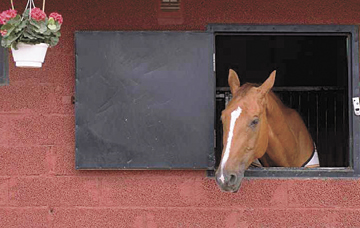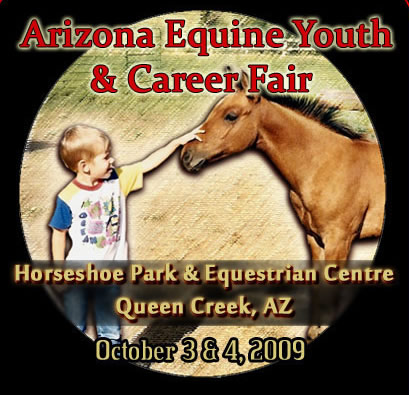
Healthy as a Horse
Feeding – the basis for health care
By Kimberly A. Gryl, DVM | September 30, 2009
 As horse owners, we are more involved in feeding our horses than most other animals. For instance: when feeding our dogs or cats, most of us buy a bag off the store shelf or from our veterinarian (in the case of prescription diets), open it, and feed the recommended amount once or twice a day. A water bowl or bucket refilled daily is also essential. Running the bowls through the dishwasher regularly keeps them clean and sanitized. Most dogs and cats appear to be pretty happy with that, and live a pretty regular life with that diet – unless they are picky; then we end up catering to them. There are the few of us who put in considerable time and effort cooking for their pets. This food is not commercially processed, but prepared in the home setting.
As horse owners, we are more involved in feeding our horses than most other animals. For instance: when feeding our dogs or cats, most of us buy a bag off the store shelf or from our veterinarian (in the case of prescription diets), open it, and feed the recommended amount once or twice a day. A water bowl or bucket refilled daily is also essential. Running the bowls through the dishwasher regularly keeps them clean and sanitized. Most dogs and cats appear to be pretty happy with that, and live a pretty regular life with that diet – unless they are picky; then we end up catering to them. There are the few of us who put in considerable time and effort cooking for their pets. This food is not commercially processed, but prepared in the home setting.
Then it comes to feeding the horses. We have to decide what feeds to feed them. We have to decide in what form we want the feed, depending upon choices offered. Options include hay that is baled, cubed, or pelleted; a sweet feed type of grain, a pelleted type of grain, various bran choices, a complete feed, vitamins and minerals, salt supplement, and other dietary additives. In comparison to dogs, there is not a lot of cooking to be done for horses. It is all either already processed (pelleted), or it is essentially unaltered (grown and baled). What types of hay do we feed? Why? Should it be a grass hay, such as Bermuda or Timothy? Should it be a legume hay, such as alfalfa? What about a mix? What about imported hays (like Colorado brome)? Similar choices come in pelleted hay form as well – a straight pellet (grass vs. alfalfa), or a blend.
What one feed store carries in feed forms and brands, another feed store may not. Once we find a feed store we like, we tend to stick with it. We develop a relationship with people there, and they in turn become dependent on us as customers, as far as ordering and stocking – not only feed, but supplements and other products as well. We depend upon the employees there to give us guidance for substituting feeds, purchasing quantity, and feed storage. It may go beyond just feeds. Some feed stores also carry farm supplies, halters and lead ropes, and other means of daily essentials which we could not do without.
The basis for a good feed program, no matter where we purchase the feed or what our horses are eating, is to supply good quality feed material, in a palatable form, at fairly consistently times each day, in balanced rations, and have clean water available at all times. Sounds easy, right? Actually, we're already doing this (for the most part). The tricky part comes in when horses have health conditions requiring them to change diets. Horses that have dietary intolerance problems, such as food allergies, need special testing and permanent dietary changes. Those that have overweight/obesity problems are prone to laminitis and metabolic diseases, and are some of the most at-risk equines. This is not only true of large horses, but also Miniature horses, ponies, and donkeys. These are a few of the health problems we face today.
As owners, the best way to gain control over these problems and keep our horses healthy is to work closely with veterinarians. As a veterinarian, I feel the best way for me to manage horses is through regular and thorough health exams at least twice a year, and tailoring a health care program to each individual horse. Certainly there is a lot that can be managed on a "herd level" for the larger farms and ranches. But even within a herd, every horse must still be attended to as an individual. If you as a horse owner feel that your horse is "not quite right," then we'll spend extra time with him or her, until we figure out why.
Dietary changes, no matter how slight, can often make a huge difference not only in how your horse looks, but he he/she feels as well. We need to look at the whole horse, not just what you feed. Perhaps poor performance is the limiting factor. Perhaps nutritional imbalance or lameness is the cause of the poor performance. With a thorough evaluation, we as veterinarians will do our best to ensure that your horse feels the best that it can. Please schedule an appointment if you have any questions, or if it has been a while since your last visit with us.
Chaparral Veterinary Medical Center is a full service veterinary hospital and clinic for horses, dogs, cats, and exotics. They offer not only quality primary care services but also provide specialists for the most demanding equine referral cases. Please visit cahosp.com.

